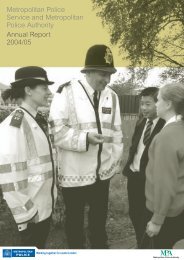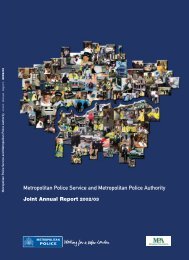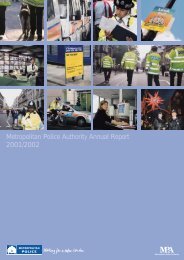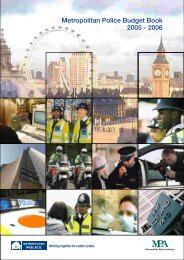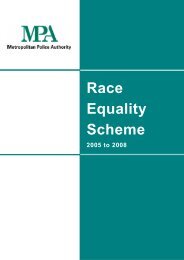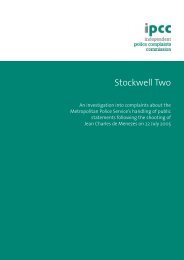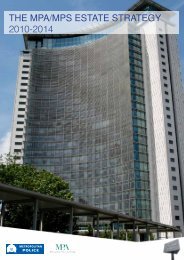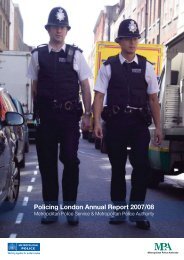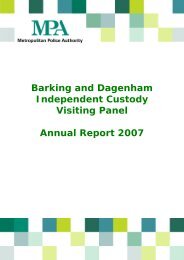Final Report of the Morris Inquiry: The Case for Change
Final Report of the Morris Inquiry: The Case for Change
Final Report of the Morris Inquiry: The Case for Change
You also want an ePaper? Increase the reach of your titles
YUMPU automatically turns print PDFs into web optimized ePapers that Google loves.
THE CASE FOR CHANGE<br />
notices was a reaction to legal advice that <strong>the</strong>re was insufficient evidence to proceed on<br />
criminal matters and that consequently <strong>the</strong> MPS were resorting to discipline matters. <strong>The</strong><br />
situation was far from ideal.” (Independent investigators’ report.)<br />
10.31 In addition, Superintendent Dizaei told us in his submission that: “My lawyers<br />
who have represented superintendents <strong>for</strong> many years were astonished in <strong>the</strong> way <strong>the</strong><br />
investigation was unfolding. It seemed to <strong>the</strong>m and o<strong>the</strong>rs that <strong>the</strong>re was no coordination, no<br />
aim but a series <strong>of</strong> seat <strong>of</strong> <strong>the</strong> pants decisions based on no rational [sic] or logic.”<br />
10.32 We think this lack <strong>of</strong> co-ordination led to an unfocused and disproportionate<br />
investigation, where <strong>the</strong> MPS concentrated on minutiae that were unlikely to take<br />
<strong>the</strong> matter much fur<strong>the</strong>r and seemingly put evidence <strong>of</strong> greater strength on a back<br />
burner.<br />
10.33 In response to this criticism, <strong>the</strong> MPS cites problems with <strong>the</strong> legislative<br />
framework <strong>for</strong> police discipline, in particular section 75 (3) Police Act 1996. This<br />
section has now been replaced but it is still <strong>the</strong> case that, if a criminal <strong>of</strong>fence may<br />
have been committed, no misconduct process can take place until <strong>the</strong> Director <strong>of</strong><br />
Public Prosecutions has considered <strong>the</strong> criminal aspects.<br />
10.34 We accept that this represents <strong>the</strong> legal position but consider that <strong>the</strong> lack <strong>of</strong><br />
co-ordination led to ef<strong>for</strong>ts being directed at attempting to find evidence to<br />
support a criminal case, as opposed to simply moving ahead with conduct<br />
proceedings. We are not alone in our view and cite again <strong>the</strong> views <strong>of</strong> <strong>the</strong> IPCC<br />
Review Panel:<br />
“We consider that several <strong>of</strong> <strong>the</strong> misconduct allegations could and should have been<br />
investigated as such and prosecuted as such a good time ago, instead <strong>of</strong> which some <strong>of</strong> <strong>the</strong>m<br />
were put inappropriately into a criminal case that was <strong>the</strong>n abandoned late in <strong>the</strong> day, and<br />
o<strong>the</strong>rs apparently left in <strong>the</strong> sidings until all <strong>of</strong> <strong>the</strong> criminal matters had been pursued.”<br />
10.35 <strong>The</strong> MPS has told us that what emerges from consideration <strong>of</strong> Operation<br />
Helios is that: “those who have had <strong>the</strong> widest extent <strong>of</strong> exposure to <strong>the</strong> case, with <strong>the</strong><br />
obvious exception <strong>of</strong> Superintendent Dizaei, appear to be most satisfied as to proportionality<br />
and those who have not had such access, appear less satisfied. In <strong>the</strong> end <strong>the</strong> MPS accepts, and<br />
has always accepted, that mistakes will have been made but would rely on <strong>the</strong> fact that <strong>the</strong><br />
most detailed scrutiny <strong>of</strong> this case occurred during <strong>the</strong> trial … after four weeks <strong>of</strong> voir dire<br />
presented by one <strong>of</strong> <strong>the</strong> finest defence advocates <strong>of</strong> <strong>the</strong> criminal bar, <strong>the</strong> Recorder <strong>of</strong> London<br />
specifically and wholly rejected defence submissions that <strong>the</strong> investigation had been<br />
characterised by bad faith and disproportionality.”<br />
10.36 We have considered <strong>the</strong> text <strong>of</strong> <strong>the</strong> Recorder’s judgment in which he<br />
concludes: “I do not find that <strong>the</strong>re was any element at all <strong>of</strong> bad faith. Nor do I find despite<br />
some minor errors that <strong>the</strong>re was anything approaching serious fault amounting to gross<br />
negligence in <strong>the</strong> course <strong>of</strong> <strong>the</strong> operation.”<br />
242



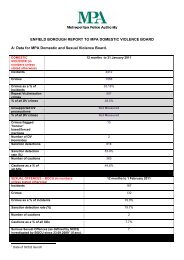
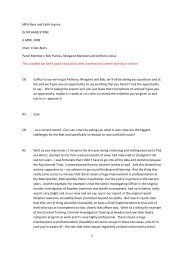
![Appendix 1 [PDF]](https://img.yumpu.com/51078997/1/184x260/appendix-1-pdf.jpg?quality=85)
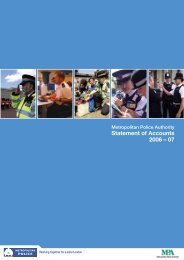
![Transcript of this meeting [PDF]](https://img.yumpu.com/50087310/1/184x260/transcript-of-this-meeting-pdf.jpg?quality=85)
![Street drinking in Hounslow [PDF]](https://img.yumpu.com/49411456/1/184x260/street-drinking-in-hounslow-pdf.jpg?quality=85)
